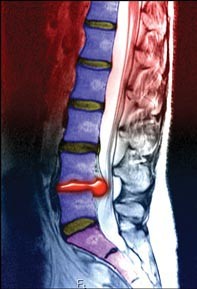A cause of cauda equina syndrome
Case scenario
Wilma, aged 51 years, presented for help for her depression. She had had a difficult few years. She had left an abusive husband and soon after had suffered from a prolonged viral type infection that had left her exhausted and with what she said had been diagnosed as ‘cauda equina syndrome’. She reported that, without any obvious trauma, she had developed severe low back, buttock and perineal pain associated with bilateral leg weakness and paraesthesia, and bladder and bowel weakness. The pain had been such that she had been opiate dependent for many months, had been unable to keep working and had ultimately been treated with disc decompression that had only marginally helped her pain. By the time of this consultation, however, she was managing better but the major problem was with persisting weakness and paraesthesia.Her only current regular medication was gabapentin.
What has happened to Wilma and how should she be managed?

